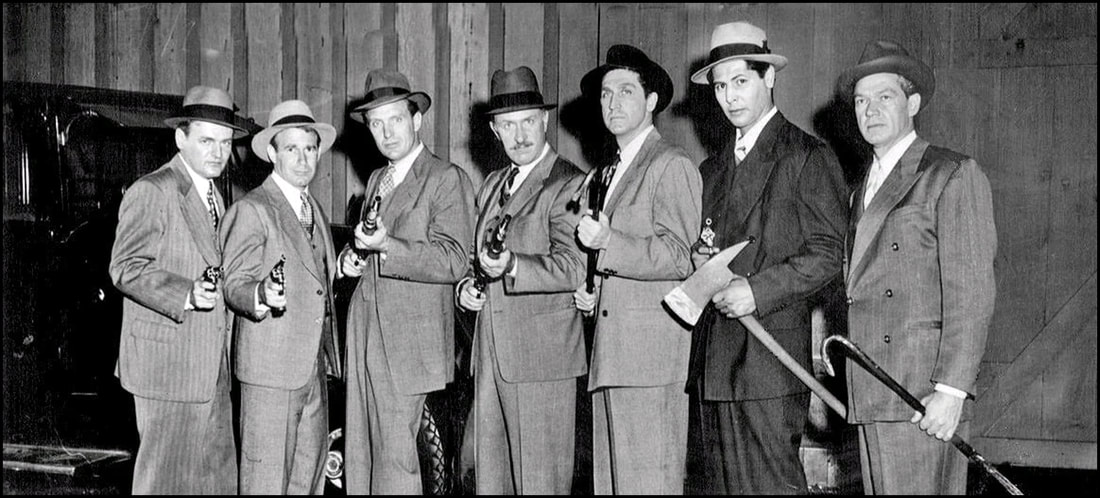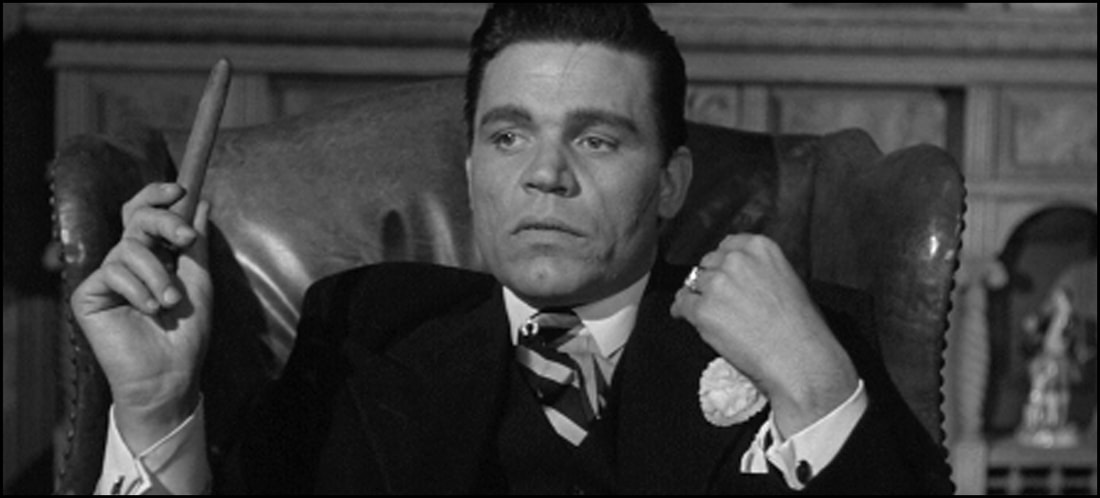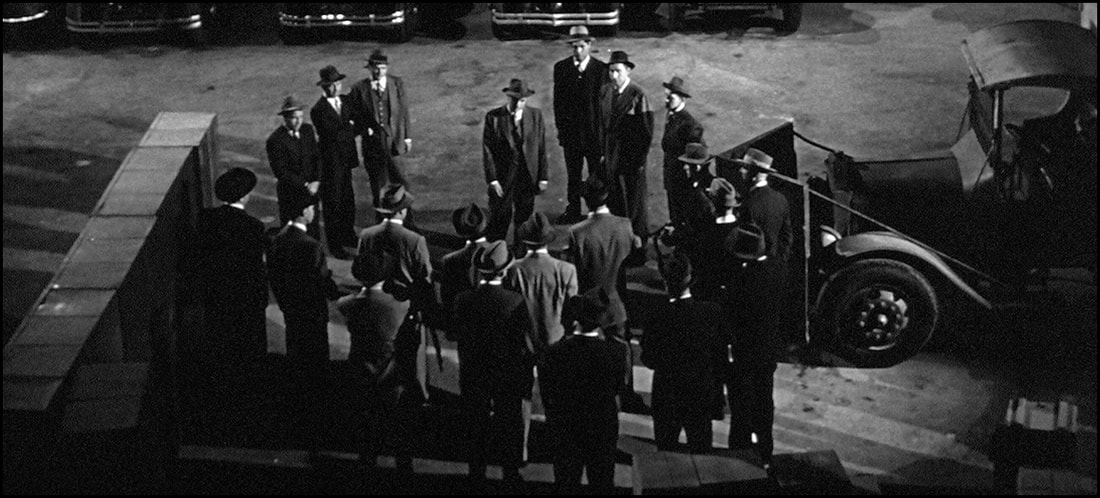Without getting too much into the weeds, I grew up in a small Midwestern town that was surprisingly revered for its violence. Much of this stemmed from the fact that it kinda/sorta had some bad blood controlling local businesses in the early half of the 20th century, and a great deal of gambling and general lawlessness (or a lack of respect for the legal system) stayed in practice throughout the 1950’s, 1960’s, and 1970’s. This little town in the middle of nowhere even had a reputation amongst the neighboring bergs for being a place you didn’t want to get caught in after dark; and, yes, such repute did make for some interesting high school experiences when I’d travel to other cities for competition. Suffice it to say, we didn’t get ‘messed with’ all that much, even though we really weren’t all that much to look at.
Though I’ve never had it verified, there was even a bit of a local legend involving our townies having a bit of a scuffle with some of Al Capone’s men back in the 1920’s. Even though I’ve no way of knowing whether or not it was entirely accurate, this commonly accepted ‘myth’ was what initially propelled my interest in learning more about the most notorious name associated to crime and the great experiment that was American Prohibition. I rarely, if ever, miss out on the latest non-fiction book releases exploring the life of the gangster; and, yes, my interest has even evolved over the years to consider films and television series wherein ‘Snorky’ may have played into the affairs.
So … I’ve seen The Scarface Mob (1959) before … long before, in fact. I couldn’t say where or when – it most likely was a home video release, though it could’ve been a pay-cable airing or Turner Classic Movies – but I still jumped at the chance to inspect Arrow Films’ upcoming DVD re-release of this great story. While my personal knowledge of Capone and Prohibition makes me a bit weary with a few elements of the production, I still find it an entertaining account of Eliot Ness and his Untouchables squad as they fought the good fight against a criminal overlord and managed to ‘get out alive’ when so few who went up against the mob did.
(NOTE: The following review will contain minor spoilers necessary solely for the discussion of plot and/or characters. If you’re the type of reader who prefers a review entirely spoiler-free, then I’d encourage you to skip down to the last few paragraphs for the final assessment. If, however, you’re accepting of a few minor hints at ‘things to come,’ then read on …)
From the film’s IMDB.com page citation:
“Story of how a group of incorruptible federal lawmen helped put 1920s’ Chicago gangster Al Capone in prison.”
Sometimes, it’s important to understand where a project came from in order to underscore why it deserves to be appreciated.
So … it kinda/sorta begs the question about how a program about crimefighting Eliot Ness grew popular in the first place?
It wasn’t as if the reviews for Mob were incendiary (in a good way), though there were some who praised its no-nonsense approach to storytelling and its depiction of the federal government versus the criminal underworld. Furthermore, the television landscape wasn’t exactly empty of crime dramas at the time as studios were finding them a bit easier to produce than were Westerns which had ruled the roost for quite some time. The answer to such a question probably has several educated answers – the gist of which I’ll ignore – but I’ve always thought it tied in with the public’s romanticism with, simply, ‘The Mafia,’ an entity’s existence that had finally been breached and exposed by the U.S. government’s Kefauver Commission in the early 1950’s.
In 1957, author Oscar Fraley released his autobiographical memoir with Ness’s cooperation; and The Untouchables was born as its own phenomenon. It was soon optioned by Desilu for production; and, thus, the series came to pass.
As a founding installment, Mob works well on many levels, though it’s also safe to advise that it’s a slow-moving set-up. Ness (as played by Robert Stack) is a bit stiff in places, some of which is likely owed to what he and director Phil Karlson thought would be sufficient characterization for a tried-and-true lawman who cannot be ‘touched’ by bribes and corruption. Once he recruits a squad of like-minded professionals to, essentially, have his back, the script from Paul Monash truly becomes something special: audiences are given an almost behind-the-scenes look at how these learned officers of the law both acted and behaved above reproach, and there’s a modest sense of camaraderie developed as a consequence of their close quarters. Of course, it’s also necessary to point out that it isn’t until the famed big guy himself – Al Capone (Neville Brand) – appears that The Untouchables truly rises to its occasion. (Capone was incarcerated when the show began, but he shows up once released from prison.) Then it becomes clear just how diametrically opposed these two figures were, and undoubtedly audiences were hungry for the moments that they’d share the screen together.
Surprisingly, Mob doesn’t quite celebrate Capone’s notoriety as much as later projects would. Sure, he’s a menace here, and Brand’s portrayal – though a bit culturally dated – might be seen as far too stereotypical to be accurate. (I’ve also read that Italian-Americans weren’t exactly thrilled with the show and how it depicted their people, but I’ll leave that, too, to historians.) What matters to me is the undercurrent vibrating through the 100+ minute run-time; and – on that front – the production succeeds. In fact, the second half of Mob is surprisingly violent for the day and time when it aired; and this commitment to realism is likely what kept the resulting series a favorite amongst audiences of the era.
The Scarface Mob (1959) was produced by Desilu Productions. DVD distribution (for this particular release) has been coordinated by the fine folks at Arrow Films. As for the technical specifications? While I’m no trained video expert, I found the sights-and-sounds to this high-definition presentation to be exceptional from start-to-finish: there’s a bit of rather obvious grain in several of the ‘nighttime sequences’ that is a bit unfortunate, but it isn’t as distracting as I’ve seen elsewhere. Lastly, if you’re looking for special features? Alas, I’m only provided a copy of the disc – so I can’t speak to the particulars of many print extras that are listed on the item’s press materials – but there are a few video essays that, frankly, don’t much cover this production so much as they give biographical and/or historical details about Prohibition, Ness, and Capone. Honestly, I wanted more about this project … not a history lesson. Disappointing.
Recommended.
If you’re familiar with TV’s The Untouchables (1959-1963) even casually, then you owe it to yourself to see how it all began with this pilot telefilm, The Scarface Mob (1959). Having seen only a handful of episodes of the program, I think I’ll admit that I appreciated the telefilm a bit more because it is a self-contained story that deals directly with the Ness/Capone kinda/sorta showdown factually, ignoring the usual Hollywood sentiment to jazz it up with either unnecessary or inaccurate dramatics. Yes, certain creative liberties are taken, but this is still a bare bones procedural that effectively uses history as a backdrop to tell a solid story. It’s definitely worth a view.
In the interests of fairness, I’m pleased to disclose that the fine folks at Arrow Films provided me with a complimentary Blu-ray copy of The Scarface Mob (1959) by request for the expressed purpose of completing this review. Their contribution to me in no way, shape, or form influenced my opinion of it.
-- EZ




 RSS Feed
RSS Feed